Who Is Liable in a FedEx or UPS Truck Accident?
When you are in an accident with a FedEx or UPS truck, liability extends beyond the driver to the corporation itself. The responsible party could be the driver, the shipping company (FedEx or UPS), a third-party contractor, a maintenance provider, or even the manufacturer of a faulty truck part.
Determining who is legally responsible is complicated by the business models these companies use, particularly the distinction between employees and independent contractors. However, Florida law provides a framework for holding these powerful companies accountable for the harm their operations cause, and a Tampa truck accident lawyer can help you pursue justice if you were injured.
If you have a question about an accident involving a delivery truck, call us at (813) 445-8161. One conversation is all it takes to understand your options.
Table of Contents
ToggleKey Takeaways for FedEx and UPS Truck Accident Liability
- Multiple parties may be liable. Responsibility isn’t limited to the driver. Liability could extend to FedEx or UPS directly, a third-party contractor, a maintenance provider, a parts manufacturer, or a cargo loading company.
- Employee vs. contractor status matters. UPS primarily uses employees, while FedEx often relies on independent contractors. Even so, courts may treat contractors as employees if the company exerts significant control over their work.
- Florida’s modified comparative negligence rule applies. You may still recover compensation if you’re less than 51% at fault, but your award is reduced by your share of responsibility. Strong evidence is needed to prevent insurers from shifting unfair blame onto you.
Who Are the Potential At-Fault Parties in a Delivery Truck Crash?
 After a crash, it seems obvious that the driver is at fault. But in a commercial truck accident, the lines of responsibility are rarely that simple.
After a crash, it seems obvious that the driver is at fault. But in a commercial truck accident, the lines of responsibility are rarely that simple.
FedEx and UPS are massive corporations with complex structures and teams of lawyers. FedEx, for instance, relies on a network of thousands of independent contractors, which they may use to try and distance themselves from liability. This may make you feel like you’re up against a corporate giant with endless resources, while you’re just trying to figure out how to pay your medical bills, which is often the case for victims of truck accidents in Tampa.
The law recognizes that responsibility isn’t always limited to the person behind the wheel. We will investigate every possibility to determine who is truly at fault. Here are the parties we typically examine:
- The Driver: The individual operating the truck. We will look into their driving history, training records, and whether they violated traffic laws or federal safety regulations at the time of the crash.
- The Shipping Corporation (FedEx or UPS): The company’s own policies, training procedures, and hiring practices are under scrutiny. If they hired a driver with a poor safety record or encouraged drivers to speed to meet deadlines, the company itself may be directly negligent.
- A Third-Party Contractor: Many FedEx drivers are not direct employees. If the driver was an independent contractor, we will investigate the relationship between the contractor and FedEx to establish who holds the ultimate responsibility.
- A Maintenance Company: Commercial trucks require regular, specialized maintenance. If the accident was caused by mechanical failure, such as faulty brakes or a tire blowout, the company responsible for servicing the vehicle could be liable.
- A Parts Manufacturer: If a defective part on the truck was the cause of the failure, the company that designed and manufactured that part could be held responsible under product liability laws.
- A Cargo Loading Company: Improperly loaded or secured cargo shifts during transit, causing a driver to lose control. The company that loaded the truck may share in the liability.
How Is a Company Like UPS or FedEx Held Responsible for Their Driver’s Actions?
You might be wondering how a company is on the hook for something their driver did. The answer lies in a legal concept called respondeat superior, which is Latin for “let the master answer.”
Simply put, this doctrine holds an employer legally responsible for the wrongful acts of an employee, as long as the employee was acting within the scope of their employment when the act occurred.
For this to apply, we typically need to show two things:
- The driver was an employee. This is generally straightforward with UPS, as most of their drivers are direct employees of the company.
- The driver was on the job. This means the accident happened while the driver was making deliveries, driving to or from a depot, or otherwise performing their work duties.
This principle exists because companies profit from their employees’ work, so they must also bear the responsibility for the risks that work creates. It also acknowledges that the company is in the best position to prevent accidents through proper hiring, training, and supervision.
For example, federal Hours of Service regulations exist to prevent tired drivers from being on the road. If a company pressures a driver to violate these rules, leading to a fatigue-related accident, the company is responsible. Driver fatigue is a leading cause of commercial truck accidents.
What Happens if the Driver Was an Independent Contractor?
This is where many of these cases become more challenging, particularly with FedEx. The company has structured its business around the use of independent contractors, in part to limit its direct liability in accidents. Generally, a company is not responsible for the negligence of an independent contractor.
However, that is not the end of the story.
The label “independent contractor” is not absolute. We look at the reality of the relationship between the company and the driver. If FedEx or UPS exercises significant control over the driver’s work, the law may treat that driver as an employee for liability purposes, which is why you may need a truck accident lawyer to sort through these complexities.
We investigate questions like:
- Does the company require the driver to wear a uniform and drive a branded vehicle?
- Does the company control the driver’s route and delivery schedule?
- Does the company dictate the methods and tools the driver must use?
- Does the company provide the training?
If the answer to many of these questions is “yes,” we argue that the driver is an employee in all but name, making the company vicariously liable.
Even if the driver is a true independent contractor, the corporation may still be liable under a theory of direct negligence. This occurs if the company was careless in:
- Negligent Hiring: Hiring a contractor with a known history of reckless driving or safety violations.
- Negligent Supervision: Failing to monitor the contractor for compliance with safety standards and regulations.
- Negligent Training: Failing to provide adequate training on company policies or safety procedures.
Large corporations understand the financial risks associated with accidents. Our role is to ensure that their resources are used to fairly compensate those harmed by their operations, regardless of the driver’s employment status, and we can help you file a claim for a truck accident to pursue the compensation you deserve.
Could Other Companies Be Liable for the Accident?
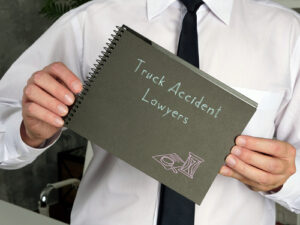 Yes. A crash is typically the result of a chain of failures, and multiple parties may share the blame. A thorough investigation looks beyond just the driver and the shipping company to uncover all potential sources of liability. This opens up additional avenues for compensation, which may be needed to cover the costs of severe injuries like traumatic brain injuries or spinal cord damage.
Yes. A crash is typically the result of a chain of failures, and multiple parties may share the blame. A thorough investigation looks beyond just the driver and the shipping company to uncover all potential sources of liability. This opens up additional avenues for compensation, which may be needed to cover the costs of severe injuries like traumatic brain injuries or spinal cord damage.
Here are a few examples of third-party liability:
- The Maintenance Shop: Federal law requires that commercial vehicles be systematically inspected, repaired, and maintained. If a maintenance provider cuts corners on a brake job or fails to identify a worn-out tire, and that failure leads to an accident, that shop is liable for its negligence under regulations like 49 CFR Part 396.
- The Truck or Parts Manufacturer: If a design or manufacturing defect in the truck itself caused the crash—for example, a steering component that suddenly fails—a product liability claim may be brought against the manufacturer.
- The Government Entity: In some cases, a poorly designed intersection, a malfunctioning traffic signal, or a dangerously maintained road could contribute to an accident. In these situations, it may be possible to file a claim against the city, county, or state entity responsible for the roadway.
What Steps Are Involved in Proving Who Was at Fault?
Their insurance carriers will conduct their own investigation, looking for any evidence to argue that you were at fault. Our job is to build a stronger case based on objective facts, which is why it’s important to hire a truck accident attorney who can protect your rights and fight for fair compensation.
This process involves gathering and analyzing key evidence, including:
- The Truck’s “Black Box”: Most commercial trucks are equipped with an Electronic Logging Device (ELD) and an Event Data Recorder (EDR). These devices record a wealth of information, such as the truck’s speed, braking patterns, GPS location, and the driver’s hours of service. This data is invaluable in reconstructing the moments before the crash.
- Driver Records: We will request the driver’s employment file, which includes their driving history, training records, any past disciplinary actions, and drug and alcohol test results.
- Company Policies and Procedures: We will examine the company’s own safety manuals and training materials to see if they were following their own rules, as well as the standards set by the Federal Motor Carrier Safety Administration (FMCSA).
- Witness Statements: We will identify and interview anyone who saw the accident occur to get their perspective on what happened.
- Accident Reconstruction: In complex cases, we work with accident reconstructionists who use physical evidence from the scene and vehicle data to create a scientific model of how the crash occurred.
How Does Florida Law Affect My Claim?
Florida has a specific rule that has a significant impact on your ability to recover compensation. It is called the modified comparative negligence rule.
Here’s what that means for you:
Under Florida Statutes § 768.81, you still recover damages even if you were partially at fault for the accident. Your compensation will be reduced by your percentage of fault. For example, if you are found to be 10% at fault, your final award will be reduced by 10%.
However, there is a limit. If you are found to be more than 50% at fault for the accident, you are barred from recovering any compensation at all.
This rule makes it extremely important to have a strong advocate who protects you from the insurance company’s attempts to shift an unfair amount of blame onto you.
Frequently Asked Questions About FedEx and UPS Accidents
Does it matter if the truck was a smaller delivery van versus a large semi-truck?
From a legal standpoint, no. Both are commercial vehicles, and the same principles of negligence and vicarious liability apply. The severity of the injuries may differ, but the process for determining fault is the same.
What if the driver says they were on a break when the accident happened?
The company may try to argue they are not responsible if the driver was on a “personal detour.” However, short breaks for meals or rest are typically considered part of the scope of employment, meaning the employer is still liable.
How long do I have to file a lawsuit in Florida?
For most personal injury cases in Florida, you have two years from the date of the accident to file a lawsuit. This deadline was changed from four years in 2023, so you must act well before this deadline, as gathering the evidence needed to build a strong case takes time.
Will my case definitely go to trial?
Most personal injury cases are settled out of court. We prepare every case as if it will go to trial, which puts us in the strongest possible position to negotiate a fair settlement on your behalf.
What if the driver was a seasonal or temporary hire for the holidays?
Even if the driver was a temporary employee, the company is still responsible for their actions while they are on the job. The same rules of vicarious liability apply.
Let Us Handle the Details, So You Can Focus on Healing
 You are dealing with enough right now without having to take on a corporate legal team by yourself. Our practice focuses on handling truck accident claims for people in the Tampa Bay area and across Florida. You don’t need to have all the answers to make the first call.
You are dealing with enough right now without having to take on a corporate legal team by yourself. Our practice focuses on handling truck accident claims for people in the Tampa Bay area and across Florida. You don’t need to have all the answers to make the first call.
If you were injured in an accident with a FedEx or UPS truck, contact Boohoff Law, P.A today at (813) 445-8161 for a free consultation.
Free Consultation
We Are Here For You 24/7
Reviews
– Elissa M.
“Really pleased with Boohoff Law! Received immediate responses when I had any questions. Treated amazingly by all staff … made this process a true breeze!”
– Caitlyn M.
– Brandy K.
Related Posts
I Was Partially At-Fault in a Rear-End Crash. Can I Still Get Compensation in Florida?
I Was a Passenger in an Uber Accident. What Are My Rights?
What Damages Can I Recover After a Jackknife Truck Accident?
Recovery is personal.
We’re here for you.
We’re close by. And if you can’t make it to us, we’ll meet you where you need us, at home or in the hospital.
You're better off with Boohoff.
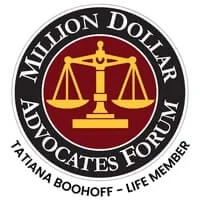

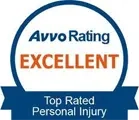

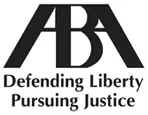
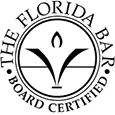





The information on this website is for general information purposes only. Nothing on this site should be taken as legal advice for any individual case or situation. This information is not intended to create, and receipt or viewing does not constitute, an attorney-client relationship.
available 24/7
(877) 999-9999
